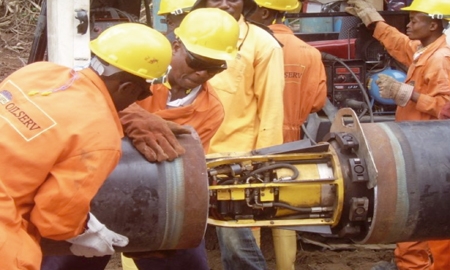Founded only four decades ago, the Nigerian oil and gas industry has already started flourishing largely due to the expertise and commitment of the international oil companies (IOCs), which dominate roughly 80 per cent of this business.
The most renowned foreign enterprises operating in the West African country include American giants such as ExxonMobil, Shell, Chevron and Total, as well as the Italian gas and oil contractor Saipem.
After the discovery of substantial quantities of oil in 1957 in southern Nigeria, these IOCs primarily took over the commercialisation process with the cooperation of the federal government. Nigerian officials encouraged the willing international enterprises in the field to contribute responsibly to the development of the Nigerian workforce and to contract locally whenever possible.
ExxonMobil has been exemplary in contracting local companies as well as training these organisations’ workforces.
“Our involvement [with indigenous companies] has to do with developing capacity and capability,” explains Mark Ward, Managing Director of ExxonMobil Nigeria, who describes the company’s relationship with the top local project developing company, DeltaAfrik, saying that ExxonMobil was integral in helping build a capable engineering team for this Nigerian cooperation. Mr Ward also adds that besides developing a workforce, ExxonMobil has made strides in significantly expanding the infrastructure throughout the country. “We try to do our best to improve the quality of life of the host communities. Our projects include water, power, roads and so on. We do what we can in partnership with the state,” he says.
This cooperation with the local government has been an integral factor with the smooth implementation of the Nigerian Content Act, passed in 2010, which calls for the enhancement of indigenous participation especially within the oil and gas sector.
Although there was some initial resistance to the legislation because of worry that the local government would hold too much power within the sector and possibly rescind clauses of initial contracts with IOCs, Mr Ward notes that Nigerians have a good track record for complying with contracts.
“Honouring agreements is one of Nigeria’s strengths. That has given us confidence to continue investing in the country,” remarks Mr Ward. He notes that many of the other IOCs have embraced the new requirements, praising the work of Ernest Nwapa, Executive Secretary of the Nigerian Content Development Monitoring Board (NCDMB), for his implementation of the new legislation.
For many of the IOCs, the National Content Act is merely a formality for something they have long since put into practice. One of the most prominent examples is Saipem, the oldest international services company in Nigeria, who has worked closely with the local electrical and instrumentation company, Desicon, for the past 10 years.
“We have been pushing for local involvement and capacity building even before this directive was put in place. We aim to exceed the requirements of the government,” states Managing Director of Saipem, Vito Testaguzza, whose company has won the Local Content Company of the Year award four years in a row. “In fact, Saipem has become a benchmark for industry standard. Many of the other contractors have patterned their local content model according to ours.”
The company’s successes due to these positive internal policies have resulted in considerable growth. Between 2007 and 2010, Saipem created more than 15,000 jobs, with operations totalling $2.41 billion (£1.5 billion). Additionally, this Italian company recently won a government contract to develop an independent power plant in addition to already having substantial involvement in the national oil refinery rehabilitation.
According to Managing Director of Desicon, Akan Udofia, Saipem has been commendable when working closely with his company. “Saipem does nothing in Nigeria without partnering with us,” explains Mr Udofia. “Saipem is so convinced that the future of Nigerian companies lies in the Nigerian capacity.”
Other companies share that similar sentiment about working with locals: in July 2012, Shell and the Nigerian National Petroleum Corporation signed a contract with Desicon and Saipem worth more than $800 million.
Besides the positive impact these companies are having on the indigenous workforce within the gas and oil sector, both local organisations and IOCs greatly emphasise corporate social responsibility (CSR) initiatives.
In fact, Desicon supports free medical services for indigenous rural populations whereas ExxonMobil provides education and microfinancing to give further opportunities to the local community.

0 COMMENTS